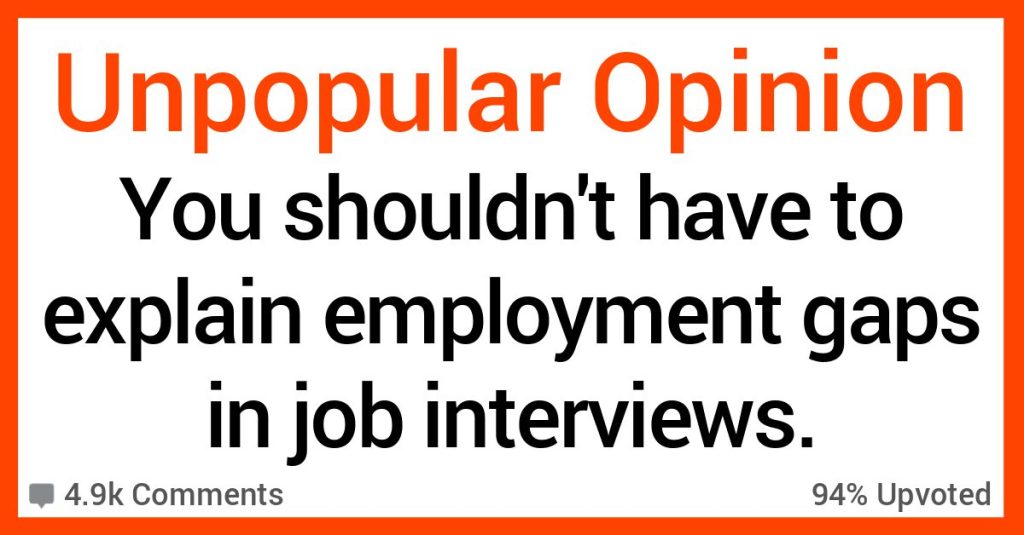Trending Now
Hey, it happens to the best of us…
Something unexpected happens in your life and you’re thrown for a loop and you don’t work for a while.
Maybe you needed a break, maybe you got laid off, maybe you had a baby, the possibilities are endless!
But sometimes these gaps are looked down upon in the professional world.
Do you think people should have to explain gaps in employment during job interviews?
People debated this question on AskReddit.
1. Not their business.
“Taking a year off to focus on yourself, take care of a loved one, or simply think about your future shouldn’t be the business of somebody interviewing you. There’s nothing wrong with wanting a break from work culture.
If you can afford to do so, and it’s what you want, I encourage it. Take a break, find yourself, sleep longer than you usually can, pick up a hobby, and enjoy your d**n life.”
2. You can try this.
“I put “relevant work history” in my CV and haven’t had any issues in the past.
If the interviewer wants to ask what other jobs you’ve held, you can answer without giving set dates, just how long you were at each place.”
3. Don’t care as much.
“I’ve taken time off 3 times in my career.
New employers don’t seem to care anymore like they used to. They only want to know that you left on good terms.
My previous employer just rehired me last month at a significantly higher salary after an 18 month sabbatical. I had given them 5 weeks notice before I left, documented everything, trained as many people as I could.
They were so appreciative and always kept the door open if I wanted to return. It’s all about maintaining good juju.”
4. Wow.
“I lost my job in march 2020 when I got covid and nearly d**d but I haven’t been able to find a job that pays remotely close to what I was making before.
And every single interview they’ve asked “oh wow, you haven’t worked since March of LAST YEAR?”
Then they ask “what happened” but in a way that shows that they really don’t care at all as to why, only that it makes me look like a s**tty potential employee.”
5. Shouldn’t be an issue.
“It’s usually never an issue if you have a good reference from your last employer.
They are more making sure the gap wasn’t because you got fired, then actually giving a s**t.”
6. It’ll be noticed.
“It’s not an issue at the interview, but it is noticed. Consistent employment with no long gaps is a good filter. Given two equally qualified candidates, employment history will be a tie breaker.
Employers want someone that will show up for their scheduled shifts. Not someone who works because they have nothing better to do.”
7. Might be other problems.
“People rarely give out jobs based on a resume, they tend to skim off as many of the best candidates as they can afford to interview and offer the position to the best candidates.
If you’re not regularly being selected for interviews there are likely multiple red flags in your resume.”
8. Does it work?
“I would usually take this time to tell them the heart wrenching lie about how I had to take care of elderly uncle/aunt and was a full time care person for them.”
9. Good advice.
“The best “lie” is usually one that reveals nothing, but implies weight behind it.
“I had to take time off to deal with a personal matter that has since been resolved. I gave [previous employer before the gap] notice, and we parted on good terms.”
The implication in that is “I did it on purpose, but do not ask me why”. Most interviewers and hiring managers know full well not to pry on such issues – it’s actually a potential liability for them to do so.
It’s far better than “I lost motivation to work and spent a year playing video games on my parents’ couch until they told me to get a job or they were going to kick me out.””
10. Explain it.
“As someone who has interviewed many people:
Taking a year off to travel before life gets in the way, spending a year to pursue professional gaming, or having difficulty finding a job in a down market have been answered people have given me where I have still offered them a position.
In almost every case explaining the gap is probably better than trying to hide it because deception will lead people to assume the worst.”
11. Frustrating.
“I was denied unemployment after being let go last spring due to bureaucratic BS and have yet to find a job despite dozens and dozens of applications. Most have just outright ghosted me, and I can’t help but wonder if they see a year of unemployment and toss my resume out.
What should matter is am I qualified, experienced, and willing to work; none of which can be determined based on an employment gap.”
12. Just don’t get fired.
“As long as your weren’t fired from your previous job it’s usually not an issue. Providing you have the experience to back it up when you jump back into the work force.
Lots of large gaps in a young persons resume make you seem unreliable. I’m not saying it’s right, but that’s the harsh reality in the eyes of most employers.”
Do you think people should have to explain employment gaps during job interviews?
Talk to us in the comments and let us know.
Thanks in advance!






